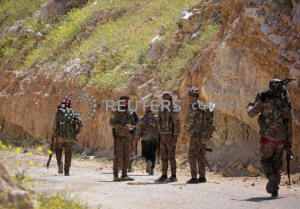|
Islamic State defeated, "caliphate"
eliminated says U.S. ally in Syria
 Send a link to a friend
Send a link to a friend
 [March 23, 2019]
By Rodi Said [March 23, 2019]
By Rodi Said
DEIR AL-ZOR PROVINCE, Syria (Reuters) -
U.S.-backed forces said they had captured Islamic State's last shred of
territory in eastern Syria at Baghouz on Saturday, ending its
territorial rule over a self-proclaimed caliphate after years of
fighting.
"Baghouz has been liberated. The military victory against Daesh has been
accomplished," Mustafa Bali, a Syrian Democratic Forces (SDF) spokesman,
wrote on Twitter, declaring the "total elimination of (the) so-called
caliphate".
At a victory ceremony near Baghouz, a brass band in red uniforms with
gold brocade played the American national anthem in front of a stars and
stripes flag and yellow militia banners. SDF leaders including both men
and women sat watching.
However, a Reuters journalist at Baghouz said some shooting and mortar
fire continued on Saturday morning and an SDF commander warned that the
coming phase in the struggle, with jihadist sleeper cells plotting
mayhem, might be even harder.
The final battle lasted weeks as huge numbers of civilians poured out,
and for many Kurdish fighters in the SDF, victory was sweeter as it
coincided with their "Now Ruz" new year.

Though the defeat of Islamic State in Baghouz ends the group's grip over
the jihadist quasi-state straddling Syria and Iraq that it declared in
2014, it remains a threat.
Some of its fighters still hold out in Syria's remote central desert and
in Iraqi cities they have slipped into the shadows, staging sudden
shootings or kidnappings and awaiting a chance to rise again.
The United States believes the group's leader, Abu Bakr al-Baghdadi, is
in Iraq. He stood at the pulpit of the great medieval mosque in Mosul in
2014 to declare himself caliph, sovereign over all Muslims.
Further afield, jihadists in Afghanistan, Nigeria and elsewhere have
shown no sign of recanting their allegiance to Islamic State, and
intelligence services say its devotees in the West might plot new
attacks.
Still, the fall of Baghouz is a big milestone in a fight against the
jihadist group waged by numerous local and global forces - some of them
sworn enemies - over more than four years.
It also marks a big moment in Syria's eight-year war, wiping out the
territory of one of the main contestants, with the rest split between
President Bashar al-Assad, Turkey-backed rebels and the Kurdish-led SDF.
Assad and his Iranian allies have sworn to recapture all Syria, and
Turkey has threatened to drive out the SDF, which it sees as a terrorist
group, by force. The continued presence of U.S. troops in northeast
Syria might avert this.

GRISLY RULE
Islamic State originated as an al Qaeda faction in Iraq, but it took
advantage of Syria's civil war to seize land there and split from the
global jihadist organization.
In 2014, it suddenly grabbed Iraq's Mosul, one of the region's great
historic cities, as well as Syria's Raqqa, and swathes of land each side
of the border.
It declared an end to modern countries and called on supporters to leave
their homes and join the jihadist utopia it claimed to be erecting,
trumpeting its currency, flag, passports and military parades.
Oil production, extortion and stolen antiquities financed its agenda,
which included slaughtering some minorities, public slave auctions of
captured women, grotesque punishments for minor crimes and the
choreographed killing of hostages.
[to top of second column]
|

Fighters from the Syrian Democratic Forces (SDF) stand together in
the village of Baghouz, Deir Al Zor province, Syria, March 20, 2019.
Picture taken March 20, 2019. REUTERS/Rodi Said/File Photo

Those excesses brought an array of forces against it, forcing it
from Mosul and Raqqa in a year of heavy defeats in 2017 and driving
it, eventually, down the Euphrates to Baghouz.
Over the past two months some 60,000 people poured out of that
dwindling enclave, fleeing SDF bombardment and a shortage of food so
severe that some said they were reduced to cooking grass.
Intense air strikes throughout the campaign have leveled entire
districts and rights groups have said they killed many civilians,
allegations the coalition has often disputed.
A mass grave the SDF discovered last month showed there were other
dangers in the enclave, though it has released no details on the
identities of the victims or how they died.
Civilians made up more than half the people leaving Baghouz, the SDF
said, including Islamic State victims such as women from the Iraqi
Yazidi sect whom the jihadists had sexually enslaved.
Thousands of the group's unbending supporters also abandoned the
enclave while still vowing their allegiance to a ruined caliphate
and showing no remorse for its victims.
At displacement camps in northeast Syria where they were sent by the
SDF, the hardliners, including many foreign women who came to Syria
and Iraq to marry jihadists, had to be kept away from other, often
traumatized, residents.
Their fate has befuddled foreign governments, who see them as a
security threat and are loath to accede to SDF entreaties to take
them back home.

DEFEAT
As the fighting progressed, the convoys of trucks from Baghouz
started to include hundreds, and then thousands, of surrendering
jihadist fighters, many hobbling from their wounds.
The SDF said it captured hundreds more in recent weeks who tried to
slip through its cordon and escape into Iraq or across the Euphrates
and into the Syrian desert.
At the end, they were besieged in a tiny camp full of rusting
vehicles and makeshift shelters, pinned against the Euphrates and
overlooked by hills held by the SDF.
Islamic State released video from inside that squalid, shell-pounded
enclave, showing its last fighters still shooting at the SDF as
smoke billowed overhead.
It was an attempt to shape the narrative of its defeat, portraying
it as a heroic last stand against overwhelming odds and a call to
arms for future jihadists.
But in Baghouz in recent weeks long lines of abject, surrendering
fighters sat or squatted in a desolate landscape, their dream of
world domination in tatters.
(Reporting by Rodi Said in Deir al-Zor province and a Reuters
journalist in Baghouz; Writing by Angus McDowall/Tom Perry; Editing
by Robert Birsel and Alexander Smith)
[© 2019 Thomson Reuters. All rights
reserved.]
Copyright 2019 Reuters. All rights reserved. This material may not be published,
broadcast, rewritten or redistributed.
Thompson Reuters is solely responsible for this content.
 |